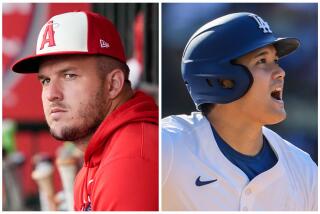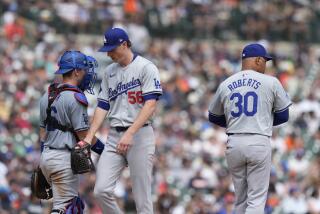Braves Face an Olympian Trip After All-Star Break
- Share via
They lost one of their leading run producers, David Justice, for the season, watched their best pitcher, Greg Maddux, experience an unaccustomed struggle and prayed that balls wouldn’t be hit to shortstop Jeff Blauser.
Through it all, they produced their best record ever through 50 games, had the best record in baseball through the 81-game midpoint and avoided the letdown that often follows the successful pursuit of an elusive goal--in this case a World Series title.
The Atlanta Braves seem headed back to October, the one sure thing to emerge again from an explosive and otherwise uncertain half season.
While the Montreal Expos hold on tenaciously in the National League East, the only remaining hurdle for the Braves as they try to make their fifth consecutive postseason appearance may be the longest road trip since Charles Kuralt packed his bags.
After returning from the All-Star break Thursday to play their first six games at home, the Braves leave on a 17-game, 19-day trip to Houston, St. Louis, San Francisco, San Diego and Los Angeles.
The Braves are making way for the Atlanta Olympics.
Traffic problems on Peachtree?
The Braves only have to worry about traffic on the tarmac.
“We’ve always played well on the road, particularly in the second half, and we’re clearly going to get the chance to be road warriors again,” General Manager John Schuerholz said.
How long is this trip? At $60.50 per day in meal money, each player will receive $1,149.50.
Enough should be left--even at room-service prices--to bring back a re-introductory gift for wives and kids.
Actually, the Braves are allowing wives to join their husbands for part of the trip at club expense.
“I think the players know the club will be supportive and will handle it well,” Schuerholz said.
“It’s a monster trip if you choose to look at it that way, but it’s really only one additional series longer than one of our longer trips.
“If they micro-manage it a series at a time, which is our approach to the season, we should be fine. I mean, it always comes down to 81 home games and 81 road games and this [year] is no different. Actually, we’ve benefited already from having an additional amount of [early] home games.”
The Braves are 32-17 at home and 21-16 on the road before the break begins today.
The best Atlanta team yet?
“Let me put it this way,” Schuerholz said. “We’ve won a hundred games in the past and expect to again. With the talent and experience, we’re capable of reaching the postseason again, where anything can happen.”
Almost upset by the wild-card Colorado Rockies in the first round of last year’s first extended playoffs, the Braves then routed the Cincinnati Reds for the league title before defeating the Cleveland Indians in the World Series.
Schuerholz said he thought the experience and intensity of the postseason would provide his team, particularly such young players as Chipper Jones, Ryan Klesko and Javier Lopez, with an additional “springboard for success,” and that has proved to be true.
“We survived a modest offensive year last year because our pitching was so good,” he said. “I thought we’d be better offensively because of the extra year of maturity for our young players.”
The Braves are again a source of sanity in the homer-happy majors.
They lead both leagues in pitching and are second in the NL in hitting, despite a revolving door in right field after the loss of Justice because of a dislocated shoulder and the recent slump by All-Star first baseman Fred McGriff, who hit .213 in June.
That experience, maturity and pitching have also allowed the Braves to prosper, despite the injury-related loss of more than 200 days of service time compared to only 43 last year, a rash of infield errors (the club made 51 last year and already has 41, including 20 by Blauser), a pitcher-catcher breakdown that has led to Eddie Perez sharing time behind the plate with Lopez and the early slump of tone-setter Maddux, who has recovered to rank among big league leaders in earned-run average at a sub-3.00.
Maddux is headed to the All-Star game, one of a record four Atlanta pitchers named by Manager Bobby Cox, who will be joined in Philadelphia by two other Braves: McGriff and Jones.
Presumably, they won’t bother unpacking, just adding another suitcase or two as they prepare to emulate the Olympic marathon and hit the road.
SHRINKING THE GALAXY
Two more falling stars in the last week of the first half:
San Diego right fielder Tony Gwynn, out four to six weeks because of a heel injury; and Cincinnati first baseman Hal Morris, out six to eight because of a broken right elbow suffered when teammate Eric Davis broke his bat on a swing and the spinning top half hit a shocked Morris in the on-deck circle.
“I was doing what they teach you to do--watch the ball,” he said of the grounder to short. “I never saw the bat, never knew what hit me.
“It’s just crazy.”
It has been more than that for baseball in the attempt to rebuild ticket sales and fan base.
Gwynn and Morris are the latest losses. Also among those down for the season or extended periods are Kirby Puckett, Ken Griffey Jr., David Cone, Randy Johnson, Brett Butler, Larry Walker, Lenny Dykstra, Darren Daulton and Justice. Bill Swift has made only one start for the Rockies, Bret Saberhagen none.
“When you lose players of the Gwynn, Griffey, Puckett caliber, you’ve lost a significant part of the game,” acting Commissioner Bud Selig said.
“It’s sad and serious, but there’s nothing you can really do about injuries.”
Amid those injuries and what Selig called “disastrous early-season weather” in the East and Midwest, attendance is up about 6% from last year and should continue to climb, spurred by summer heat and hot races in almost every division.
“Average attendance is over 26,000 now,” Selig said. “We need to get it back over 30,000, but I’m confident we’re going to look back on a very good year. We’ve progressed much more quickly than we could have predicted.”
Management’s favorite expression is “growing the game.” Too bad the enthusiastic groundswell isn’t universal. Bay Area reporters got typical Barry Bonds arrogance when they asked his reaction to a sixth All-Star selection.
“I don’t want to talk about it,” he said. “You guys ask me the same questions and I give you the same answers every year.
“Just get your 1995 newspapers and write the same . . . for 1996.
“When I get to be 40 and I’m still in the game and I get [selected], then you can come ask me.”
Don’t hold your breath, Barry.
MIDSEASON AWARDS
MVP: Mike Piazza over Jeff Bagwell in the NL; Frank Thomas over Roberto Alomar in the AL.
CY YOUNG: John Smoltz in the NL; Andy Pettitte in the AL (the second year left-hander has stabilized a rotation devoid of Cone and, for a long period, Jimmy Key).
ROOKIE: Rey Ordonez in the NL; Derek Jeter in the AL.
MANAGER: Felipe Alou in the NL; Johnny Oates in the AL.
COMEBACK: Eric Davis in the NL; Kevin Elster over Dwight Gooden in the AL.
ALL-STAR FALLOUT
Chicago Cub right fielder Sammy Sosa, on not being selected: “To be the National League leader in home runs I guess means nothing. I guess I need to hit 40 home runs and get 100 RBI by the break next year. I’m supposed to be on that team and everybody knows that.”
Montreal Expo second baseman Mike Lansing, a worthy candidate, on the selection of only two teammates, Mark Grudzielanek and Pedro Martinez, before Henry Rodriguez was selected as a replacement for Gwynn: “The problem with the Expos is they don’t know how to promote their own players. They promote the manager more than the players. Don’t get me wrong. I’m not criticizing Felipe Alou, but that’s a fact.”
NAMES AND NUMBERS
--One has to be impressed by the relaxed and confident manner in which Bill Russell has responded to his interim opportunity with the Dodgers and the positive way the players have reacted. A healthy Tom Lasorda deserves the opportunity to return, but Russell is removing any doubt as to who the heir should be.
--Now last in the AL West, the uninspiring Angels are about where they should be given that Jackie Autry’s budget precluded the re-signing of catalytic Tony Phillips, the two DL stints by Jim Edmonds, the lack of 1995 productivity by J.T. Snow, Gary DiSarcina and Garret Anderson, the 1-11 Jim Abbott disaster, and the absence of pitching leadership and consistency from the $10-million-a-year tandem of Mark Langston and Chuck Finley.
--Trade Anderson for any of the nondescript pitching available in the current market? Forget it. Put the blame on Marcel Lachemann, as the Angel manager often does to himself? Don’t expect much patience from Disney as they attempt to rebuild the fan base.
--Darryl Strawberry will ultimately move into a designated hitter platoon with Ruben Sierra--and won’t Sierra be pleased?--but the principal reason Yankee owner George Steinbrenner overrode General Manager Bob Watson’s lack of interest and moved on Strawberry when he did was that he heard division rival Baltimore (along with Seattle, Boston and Cincinnati) was hot on the Strawberry trail.
(BEGIN TEXT OF INFOBOX / INFOGRAPHIC)
Hitting the Road
LONGEST TRIP THIS CENTURY
*--*
Team (Year) Length of Trip Reason Record Chi. Cubs (1925) 34 games in 39 days Scheduled 13-21
*--*
OTHER NOTABLE TRIPS
*--*
Team (Year) Length of Trip Reason Houston (1992) 26 games, 28 days Republican National Convention Montreal (1991) 26 games, 28 days Roof damage, Olympic Stadium Seattle (1994) 20 games, 21 days Roof damage, Kingdome
Team (Year) Record Houston (1992) 12-14 Montreal (1991) 13-13 Seattle (1994) 11-9
*--*
Source: Elias Sports Bureau
More to Read
Go beyond the scoreboard
Get the latest on L.A.'s teams in the daily Sports Report newsletter.
You may occasionally receive promotional content from the Los Angeles Times.










